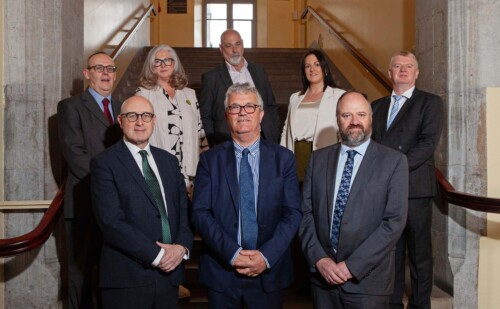Minister Harris publishes new legislation aimed at reforming and modernising governance of the Higher Education sector
By Maura O'Shea
Posted: 6 May, 2021

Minister for Further and Higher Education, Research, Innovation and Science Simon Harris TD has today (6th May) published legislation to reform and modernise the Higher Education sector.
The Higher Education Authority Act, 2021 will advance equality, diversity and inclusion at Higher Education Institutions (HEIs), while ensuring they provide accountability and transparency, as well as value-for-money for public funding.
Speaking today, Minister Harris said: “This is a monumental day for higher education and training in Ireland. We want to have the best education system in Europe and to achieve that we need to modernise.
“The Higher Education Authority (HEA) has played a crucial and excellent role in funding and regulating the sector for the past 50 years, but the country has changed dramatically in that time and that’s why this Act is so welcome and necessary.
“We owe it to present and future generations to provide an education system that will give them the tools they need to compete in a world of work which is increasingly impacted by digitalisation, automation and artificial intelligence. I firmly believe this Act will help deliver on that promise.
“I am also delighted that under this Act all HEIs will be required to have an equality statement detailing how they are encouraging access to their institutions for everyone in society, regardless of their economic or social background.
“The HEA Act will now give the HEA the legislative powers to help maintain and enhance the reputation of our sector on the world stage well into the future.”
The legislation will allow for:
- Strengthened powers for the Higher Education Authority including performance frameworks for state-funded Higher Education Institutions;
- The HEA to set conditions for funding third level institutions and the application of remedial measures if there is non-compliance;
- Strong internal governance of universities, technological universities and institutes of technology by reforming the size and composition of their governing bodies;
- A Higher Education strategy to be published every five to seven years;
- Safeguarding the autonomy of Higher Education Institutions; and
- no changes to the current legislative provisions related to academic freedom.
Minister of State for Skills and Further Education Niall Collins added: “This is not about creating an extensive suite of new responsibilities for the HEA but, instead, its new legal powers will deliver a more robust basis for the functions it is already carrying out.
“What we are trying to do here is empower each institution to realise its mission, purpose and value to society, and by doing that we can help them enrich the lives of our students.”
The Programme for Government committed to reforming how HEIs operate through their relationship with the HEA by enhancing performance, financial management, governance and transparency and to utilising the system performance framework to drive accountability and improvements in our higher education system.
HEA Chief Executive, Dr Alan Wall said: “We welcome this significant step towards reform of the Higher Education Authority Act to ensure that we have an agile, responsive and accountable higher education and research system. A modern legislative framework that recognises and underpins the inherent value of the system is now required. New legislation will support the performance of a system that has transformed, grown and evolved, in particular over the past two decades. The State invests considerable resources into our system and needs to be assured that it and our students are getting the best possible return on that investment. Our institutions require a balance between autonomy and accountability, if they are to continue to innovate and to respond to national challenges and needs.”
For further information on the Higher Education Act 2021
Notes to editors:
As set out in the July 2019 Memorandum and the December 2020 Memorandum, the higher education sector has been transformed since the HEA legislation was first put in place 50 years ago. In 1971 there were approximately 20,000 students in higher education and this has increased to over 200,000 students in the present day.
As part of its core legal function, the HEA is responsible for allocating recurrent funding to HEIs of €1.4bn in 2021 an increase estimated at 45% over 2015 levels of €968m. The HEA is also responsible for allocating up to €106m in Capital Infrastructure Funding in 2021 an increase of 130% over 2015 levels of €46m, as well as overseeing capital project delivery, advancing the higher education Public Private Partnership (PPP) Programme and planning for future capital investments.
As set out above, the HEA is now responsible for a much more extensive and diverse sector. Beyond the original small number of universities provided for in the HEA Act, 1971 the HEA’s responsibilities now extend to an expanded number of universities, new technological universities and institutes of technology.
The General Scheme proposes that the HEA shall in partnership with Quality and Qualification Ireland (QQI) and student representatives, promote student engagement programmes between students and higher education providers.
In addition, the HEA shall establish a student forum to engage with student representatives on a regular basis.
The core objectives of the HEA legislation have remained consistent throughout the development of the legislation and are as follows:
- Promote and support HEIs in achieving excellence in teaching, learning and research in higher education,
- Promote and safeguard the interests of students,
- Advance equality, diversity and inclusion in higher education,
- Provide a comprehensive governance and accountability framework to safeguard Exchequer investment in the sector and ensure accountability by HEIs for that funding,
- Maximise the contributions of higher education to social, economic, cultural and environmental development and sustainability and
- Maintain and enhance the reputation of the higher education sector, including international reputation.


